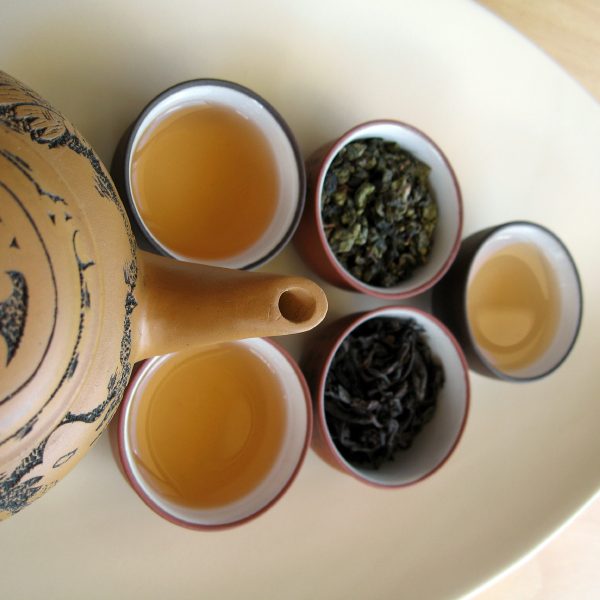Tea is the second most consumed beverage in the world, just behind water. So, when I heard that consuming green tea during early pregnancy may not be safe, I was shocked. I decided to do some research and found information stating that some scientific studies have shown that consumption of green and black tea in early pregnancy may inhibit the body’s ability to properly absorb folic acid.
We often get asked questions about consuming green tea while trying to conceive – from, “Does green tea count as a no-no as far as the no caffeine thing or does its health benefits outweigh the small amount of caffeine it has?” and “Does organic green tea affect fertility?” to “Tell me about green tea, does it affect conception?” and “I have a green tea every morning. Should I stop the green tea?”
Green Tea, Caffeine & Folic Acid
The number one reason why it may be best to consider not drinking green tea while trying to conceive and in pregnancy is that studies have shown that excessive or too much Green Tea Consumption May Lower the Body’s Ability to Absorb Folic Acid, a critical nutrient for neural tube development in a fetus. This has been found to lead to neural tube defects, including spina bifida.
Green tea also contains caffeine, approximately 24-45 mg in an 8 ounce (237mL) serving. Albeit less caffeine than black or oolong teas, coffee and caffeinated sodas, green tea still contains caffeine which can cross through the placenta to a fetus and can also enter a baby through breast milk. Because there are very few studies to prove the effects of caffeine in pregnancy or while breastfeeding, many healthcare providers suggest strictly limiting caffeine intake during these life events or avoiding it altogether.
Green Tea Health Benefits?
On the flip side of the coin, the health benefits may also support fertility health. Green tea is known to be concentrated with health benefiting antioxidants called polyphenols; the most read about polyphenol in green tea is Epigallocatechin Gallate (EGCG). Regular consumption of green tea may also increase the antioxidant capability of the blood. Antioxidants are important for fertility because they reduce the formation of free radicals in the body. Free radicals damage cells, cause cell death, and can even damage DNA (eggs and sperm are cells). However, there are many ways to consume antioxidants other than drinking green tea. Berries, peppers, and dark leafy green vegetables are all high in antioxidants.
Green tea also contains the amino acid L-theanine. In human-controlled trials L-theanine has been shown to provide a boost to the metabolic rate in humans (think weight management), supports healthy insulin levels (think PCOS and diabetes), and has anti-anxiety effects. Lastly, the catechins in green tea may kill bacteria and inhibit viruses, potentially lowering the risk of infection. Anxiety, weight and insulin control, bacterial infections, and even viruses can have an impact on a couple’s efforts to try to conceive.
To close, please weigh the pros and cons of consuming green tea for yourself while trying to conceive. Talk to your healthcare provider about consuming green tea while trying to conceive and in pregnancy, and most importantly, if drinking green tea during this time will cause you concern or anxiety, grab a glass of water with lemon and skip the green tea!
- Harvard Health Publishing. (n.d.). Flavonoids: The secret to health benefits of drinking black and green tea? Retrieved from: https://www.health.harvard.edu/heart-health/brewing-evidence-for-teas-heart-benefits
- Caffeine content for coffee, tea, soda and more. Mayo Clinic. (n.d.) Retrieved from: https://www.mayoclinic.org/healthy-lifestyle/nutrition-and-healthy-eating/in-depth/caffeine/art-20049372
- Give Up Green Tea in Pregnancy. Dr. Andrew Weil Q&A. (n.d.) Retrieved from: https://www.drweil.com/health-wellness/body-mind-spirit/pregnancy-fertility/give-up-green-tea-for-pregnancy/
- University of Maryland. Green tea. (n.d.) Retrieved from: http://accurateclinic.com/wp-content/uploads/2016/02/Green-tea-University-of-Maryland-Medical-Center.pdf
- Gunnars, K. (2018) 10 Proven Benefits of Green Tea. Retrieved from: https://www.healthline.com/nutrition/top-10-evidence-based-health-benefits-of-green-tea
- Herbal Teas and Pregnancy: Which Ones Are Safe? (2018). Retrieved from: http://americanpregnancy.org/pregnancy-health/herbal-tea/
- National Center for for Complimentary and Integrative Health. (2016). Green Tea. Retrieved from: https://nccih.nih.gov/health/greentea
- Liu, K., Zhou, R., Wang, B., Chen, K., Shi, L., Zhu, J., & Mi, M. (2013). Effect of green tea on glucose control and insulin sensitivity: A meta-analysis of 17 randomized controlled trials. The American Journal of Clinical Nutrition, 98(2), 340-348. doi:10.3945/ajcn.112.052746 Retrieved from: https://academic.oup.com/ajcn/article/98/2/340/4577179
- Stote, K. S., & Baer, D. J. (2008). Tea Consumption May Improve Biomarkers of Insulin Sensitivity and Risk Factors for Diabetes. The Journal of Nutrition, 138(8). doi:10.1093/jn/138.8.1584s Retrieved from: https://academic.oup.com/jn/article/138/8/1584S/4750821
- Yazdy, M. M., Tinker, S. C., Mitchell, A. A., Demmer, L. A., & Werler, M. M. (2012). Maternal tea consumption during early pregnancy and the risk of spina bifida. Birth Defects Research Part A: Clinical and Molecular Teratology, 94(10), 756-761. doi:10.1002/bdra.23025 Retrieved from: https://onlinelibrary.wiley.com/doi/full/10.1002/bdra.23025
- Yokozawa, T., & Dong, E. (1997). Influence of green tea and its three major components upon low-density lipoprotein oxidation. Experimental and Toxicologic Pathology, 49(5), 329-335. doi:10.1016/s0940-2993(97)80096-6 Retrieved from: https://www.sciencedirect.com/science/article/abs/pii/S0940299397800966





